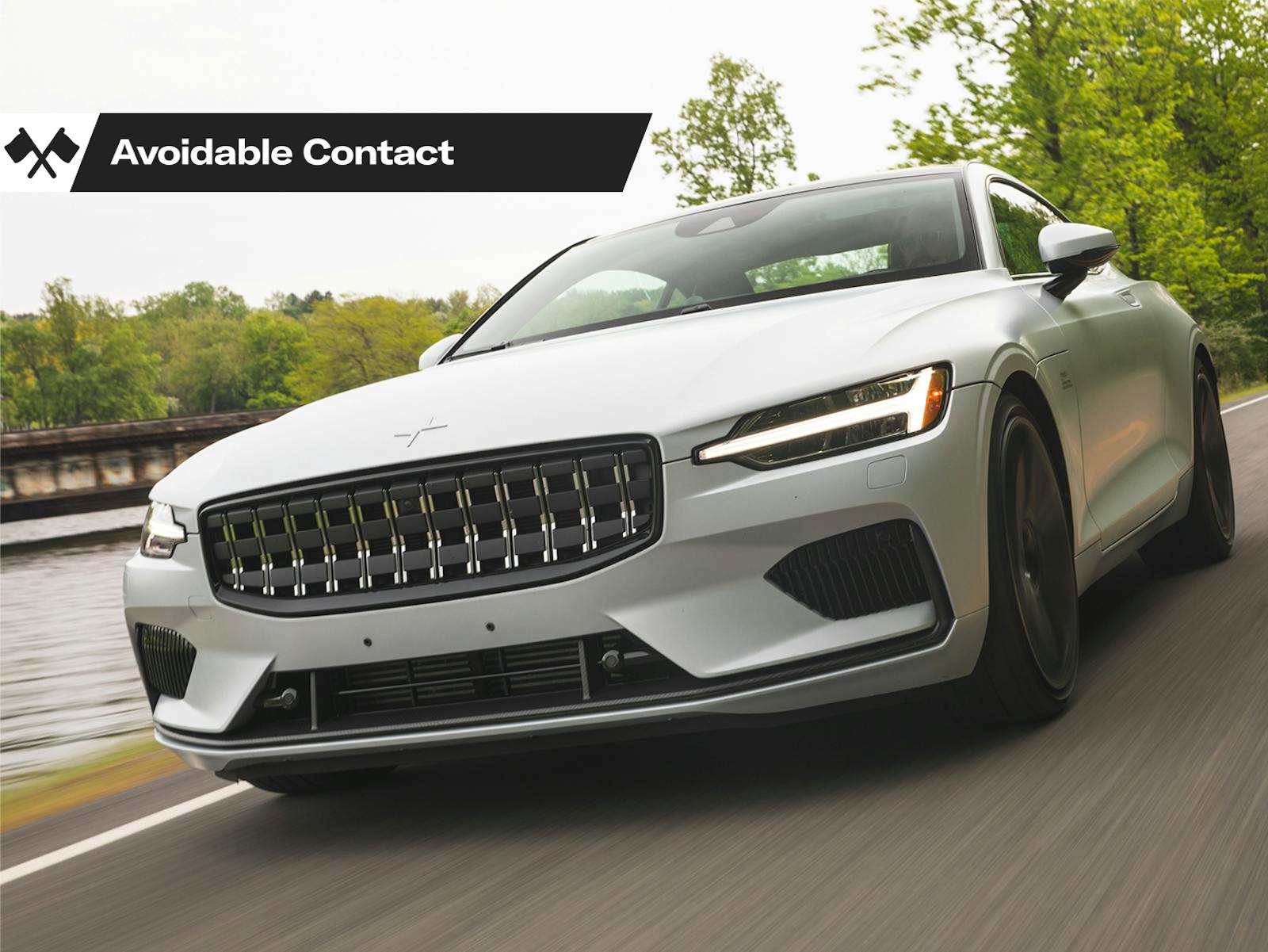Avoidable Contact #139: Electric cars … so hot right now

The mind should develop a blind spot whenever a dangerous thought presented itself. The process should be automatic, instinctive. Crimestop, they called it in Newspeak. He set to work to exercise himself in crimestop. He presented himself with propositions—”The Party says the earth is flat” … “The party says that ice is heavier than water”—and trained himself in not seeing or not understanding the arguments that contradicted them. It was not easy. It needed great powers of reasoning and improvisation.
I bet you’re tired of reading references to Orwell in this column. I’m tired of making them. But how else can you understand the crimestop our society has seamlessly applied to any discussion of what should be, and in other societies would be, an acknowledged fact—that electric vehicles pose a fire risk beyond anything we have ever seen on the American road, including certain subcompact Fords from the ’70s?
As I write this, there is a massive cargo ship adrift in the Atlantic Ocean. It’s on fire, and it’s proving very difficult to put out. The fact that it’s proving difficult to put out, even though any responding fire-control ship has literally an ocean’s worth of water with which to douse said fire, should tell you something about the chemistry, and energy, involved in EVs.
A recent Reuters “explainer” told us that EV batteries could burst into flame if they were manufactured incorrectly. That’s true. They can also burst into flame if they are perfect, because the chemistry involved is inherently volatile. And there is a lot of heat involved in their charge and discharge. If you’ve ever had your phone become uncomfortably hot in your hand, you’re aware of how it works. Now consider the fact that most EVs have literally thousands of those cells stored cheek by jowl, ready to FLAME ON in the right circumstances.
In a classic example of lying with statistics, a few pro-EV media outlets have tried to claim that EVs are far less likely to catch fire than internal-combustion cars, based on recall statistics and a light reading of NHTSA data. I have a feeling that if you adjust for use case, this disparity utterly disappears. You’re comparing a national fleet of gasoline cars that is over 12 years old on the average, being driven without maintenance in all conditions and at all possible speeds, with a walled garden of rich-people toys that rarely go anywhere.
But even the most frantic EV apologists can’t fully crimestop the fact that EV fires, when they happen, are vastly more dangerous, and far more difficult to put out, than the equivalent gasoline-engine incident. You see, gasoline is a lot like C4: it needs certain conditions to blow up. But lithium-ion batteries suffer from no such prosaic limitation of physics, because they are already in an unstable state the minute you put any charge into them. Add a bit of heat, whether from their neighbor batteries, from a high-speed impact, or from something happening nearby, and they are gonna burn, baby.
Ask any club racer, it’s pretty hard to catch a modern car on fire. I’ve seen hundreds of contact incidents on-track since the year 2001. About half a dozen have led to fire, and in one case (24 Hours of Lemons, 2008), the person in the car did not survive the situation. And that’s racing, in which bad things tend to happen at an accelerated rate. In all of these cases, however, the fire was put out within 10 minutes. Every single time.
EV fires, by contrast, can burn for days, feeding on all that stored energy in the chemicals of the battery, and they often burn too hot to be put out by conventional means. As a child, I used to thrill to auto-parts-store urban legends of “mag wheels” that burned so hot they caught the water on fire. The inherent thermal-drama potential of an EV makes magnesium wheels look like a bottle rocket, and it’s distributed throughout the entire floorpan of most electric cars, not hung out on the four corners where you can hit it with foam.
The current fire in the Atlantic, which in an exceptionally tragic turn of events is believed to have claimed Hagerty contributor Matt Farah’s latest six-figure leisure-car purchase, is an example of this at a macro scale. One EV is a nightmare to put out. A few hundred of them? You’re gonna need Valery Legasov to rise from the grave and come up with a containment strategy. Who knows how long the fire will rage on this boat, poisoning the ocean and the air and anyone who comes near it.
Thankfully, however, this could never happen outside a cargo ship, because EVs are never found in large concentrations on dry land. Oh wait—they are found in large concentrations on dry land, everywhere the politics of a country or state make it unavoidable. Think of a California parking garage 10 years from now, with a thousand EVs stacked floor by floor. What’s going to happen when one of them catches fire?
Some of my older readers are no doubt shaking their heads. “THEY WOULDN’T LET A DANGEROUS SITUATION LIKE THAT HAPPEN! IT CAN’T BE THAT BAD!” Allow me to tell you a little story about what happens when politics override sanity. Many years ago, in an effort to reduce CO2 emissions, the United Kingdom drastically changed its tax laws to grossly favor diesel cars over gasoline cars. When this happened, several high-profile people brought up the risk of diesel particulate emissions. Those risks were already well-known to scientists; in fact, California had basically put the kibosh on diesel passenger cars at that point because there seemed no way to reduce particulates.
The scientists and public figures who expressed concerns were ridiculed. We were told that the risks were negligible, and in any way the greater public health crisis of global freezing, er, global warming, er, climate change outweighed any minor risks anyway. As with EV batteries, there was adequate data to contest this assertion. But the politicians and media all tacitly agreed to crimestop such discussions.
Guess what happened? Whatever CO2 impact there might have been was vastly outweighed by an additional 38,000 deaths a year in the UK from diesel particulate exposure. The health effects among people who haven’t died? They are terrifyingly broad. So the politicians responded by banning diesels from the cities. If you own a diesel car, too bad, you should have stayed ahead of the current politics … I mean, science.
Guess what the UK is incentivizing in the place of diesels? If you guessed “the well-regulated and environmentally friendly new-generation gasoline engines” you’d be wrong, of course, They’re going all in on EVs. Wait till they start catching on fire en masse in the City of London. Week-long toxic blazes that can’t be put out, pumping carcinogens into the air at an astounding rate. Perhaps all the media outlets who have recently explained the benefits of inflation can knock out some articles about the positive aspects of breathing lithium combustion byproducts. I look forward to reading that, in a sort of let’s-watch-people-do-crazy-stuff-at-Cirque-de-Soleil way.
You get the idea. The dangers of EVs, real and frightening though they may be, don’t matter as much to the politicians as the good-boy points they’ll get for making them mandatory, just like the known dangers of diesel particulates didn’t matter to the lizard-ish people who wanted to report lowered CO2 emissions in their fiefdoms to the kingmakers at Davos. There is no adult hand on the wheel here, no Truman-esque statesman to accept the passed buck and call time on the clown show before the tent catches fire.
Oh, and if you think lithium-ion batteries are a problem, wait until we get to the much-ballyhooed “solid-state batteries” that receive so much glowing praise in the media right now. As I’ve noted before, I’m using up-to-the-minute Lithium Polymer tech in my airsoft guns. I wear gloves during the matches because at a high discharge rate these batteries will get hot enough to melt plastic. Everybody has a story about watching an airsoft gun catch fire during a match. And those are tiny 800Mah individual batteries being used in a chilly warehouse. Wait until we pack 5000 of them together in a car and let it sit outside in Phoenix during the summer. There’s gonna be a hot time in the old town tonight.
There are alternatives to this miserable state of affairs. We can take the billions and billions of dollars spent by corporations on developing battery pods that no one wants and spend it on improved combustion instead. We could fix the CAFE laws so a 2.0-liter, full-sized sedan isn’t harder to get past the Feds than a 6.2-liter truck. We could pull any one of a dozen legislative levers to encourage the development of lighter, more energy-efficient gasoline cars.
The fact that none of this is happening, and that instead we are all being expected to sign off on the consensual delusion of a future mandatory electric-vehicle infrastructure despite the fact that there is no feasible technical path to such an infrastructure, should fill you with profound unease. I am personally bewildered by the manner in which otherwise intelligent people talk about “the electric future” as if it was a real thing and not a unicorn-dust fantasy with nightmarish environmental, social, and human consequences. I feel like the only sane person in the Kool-Aid line at Jonestown.
“Hey, uh … is there any chance that the Kool-Aid isn’t going to take us to a higher spiritual place?”
“Shut up and trust the science, you bigot!”
Admittedly, there is a chance that the EV future might come to pass just the way all the midwits imagine it. We’ll need at least two scientific breakthroughs that are far less likely than the Manhattan Project, plus an infrastructure investment that makes the B-29 look like a new toilet seat for the Air Force, but … it could happen.
In the meantime, if you want to remain acceptable in polite society, you’d better practice your crimestop. And, please, pay no attention to the massive fire in the Atlantic Ocean. We have always had massive fires in the Atlantic Ocean, just like we have always been at war with, ahem, Eurasia.

